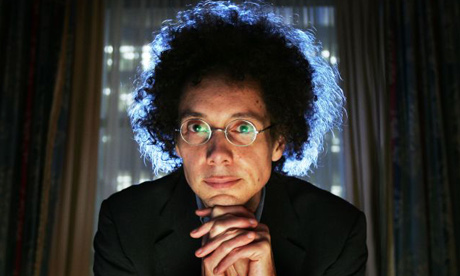
The mince pies are all gone, the turkey's finished – or beyond the reach of mayonnaise to resuscitate – and eyes already bleary from too much festivity turn wearily towards the future. It's time to look back on the year that was and ahead to the year that is to come.
One of the delights of web publishing (or should that be the terrors?) is that memories of what has gone before can be measured up against a stack of statistics, though the usual caveats apply. Editorial judgment can be stretched over the rack of click-throughs, downloads and dwell times. So in the same spirit of openness and self-examination summoned up last year, here are the top 10 stories of 2008 on theguardian.com/books.
And top of the pops, eyeing us all suspiciously out of the corner of his eye, is Malcolm Gladwell. Yes, the outlier himself is on top of the pile with an extract from his latest book. Not that it's any good to any of us now, of course, as it's off the site because the web rights have expired – though anyone who missed it first time around can get the gist from John Crace's digested version.
Once again, Gladwell's mixture of the bleeding obvious and the unnervingly precise seems to have struck a chord. This time it's the observation, reassuring and alarming in equal measure, that to be really good at anything needs a combination of talent, luck and hard work that is completely alien to most of us. He has come up with a nice, round figure of 10,000 hours' work as a kind of minimum requirement for joining the genius club – I, for one, was counting on my fingers in despair – and illustrated it with some catchy examples (the Beatles, Bill Gates, Canadian ice hockey players). His position at the top of our tree confirms not only his status as a non-fiction superstar, but also the appeal of the idea that we could all be truly great at something, if only we could find the time.
I'm going to skate rapidly over the second most popular story. It's the list of the top 100 books of all time that was published in 2002 and was our most popular story last year. Why a list from 2002, you ask? Well, as I think I said last time, this is a demonstration of the power of Google, and of the place of literature in popular culture… and let us not investigate any further.
Third on the list is another golden oldie: a polemic George Monbiot wrote around the time of Orhan Pamuk's trial for "insulting Turkishness", comparing the Turkish way of banning discussion of past atrocities with the British way of simply forgetting about them. There's a massive spike at the beginning of January, most of which seems to be attributed to the social news website reddit.com (they might want to take a look at their tagline "reddit.com: what's new online", but people in glass houses…).
Fourth is another top 100 list – see No 2 above – which I'm going to skate over even more rapidly (this one's from 2003, by the way).
In fifth place is our top news story – and no, it's not the Harry Potter sex scandal story I was imagining last year, it's a story about a teacher in Indiana who was suspended without pay for using an inspirational bestseller in the classroom (apparently there's a bit of swearing in it). It's testament to the strong passions aroused by censorship in all its guises, and another case of the wishes of a vocal minority taking precedence over those of the silent majority, as I think I read somewhere or other at the time.
Coming in at No 6 is 10 of the most interesting and significant languages on the brink of disappearing, as selected by a professor of linguistics. They include Jeru (20 speakers), N|u (only 10) and Yuchi (five). With around half of the world's 6,900 languages facing extinction before 2050, the situation is acute. The idea of being stranded alone as the seas of language retreat is at once terrifying and poignant.
No 7 on the list is a thoughtful piece by John Gray about how "secular fundamentalists" have got it all wrong. Richard Dawkins, Daniel Dennett and Martin Amis, among others, are falling into the same trap as the religious extremists they oppose, he suggests – clearly a line that has proved popular with the readers of theguardian.com/books.
It's a victory of sorts that sex, the subject that drives so much internet traffic, is relegated to eighth this year. This time it's Franz Kafka who's been caught with his trousers down, to the outrage of scholars but the wry amusement of Nick Lezard.
In a year when the best JK Rowling had to offer was The Tales of Beedle the Bard – though it was the fastest-selling title of 2008 all the same – coming in at No 9 was the latest "next JK Rowling", Stephenie Meyer. Dan Glaister's profile was published just as her latest Twilight book was published in the UK, and just before the backlash began.
Which leaves the final slot to the scramble to sign up Charlotte Roche's first novel, Wetlands, due out from Fourth Estate in February. Great to see so much interest in debut fiction, you say. Well, it might have had something to do with the description of her in the headline as "Europe's sex sensation". Some things will never change.
Like the general rule of thumb that much of what's most interesting around here goes on below the line. So following Billy Mills's excellent suggestion, and pausing only to wish you all a happy new year, I'll turn it over to you.

